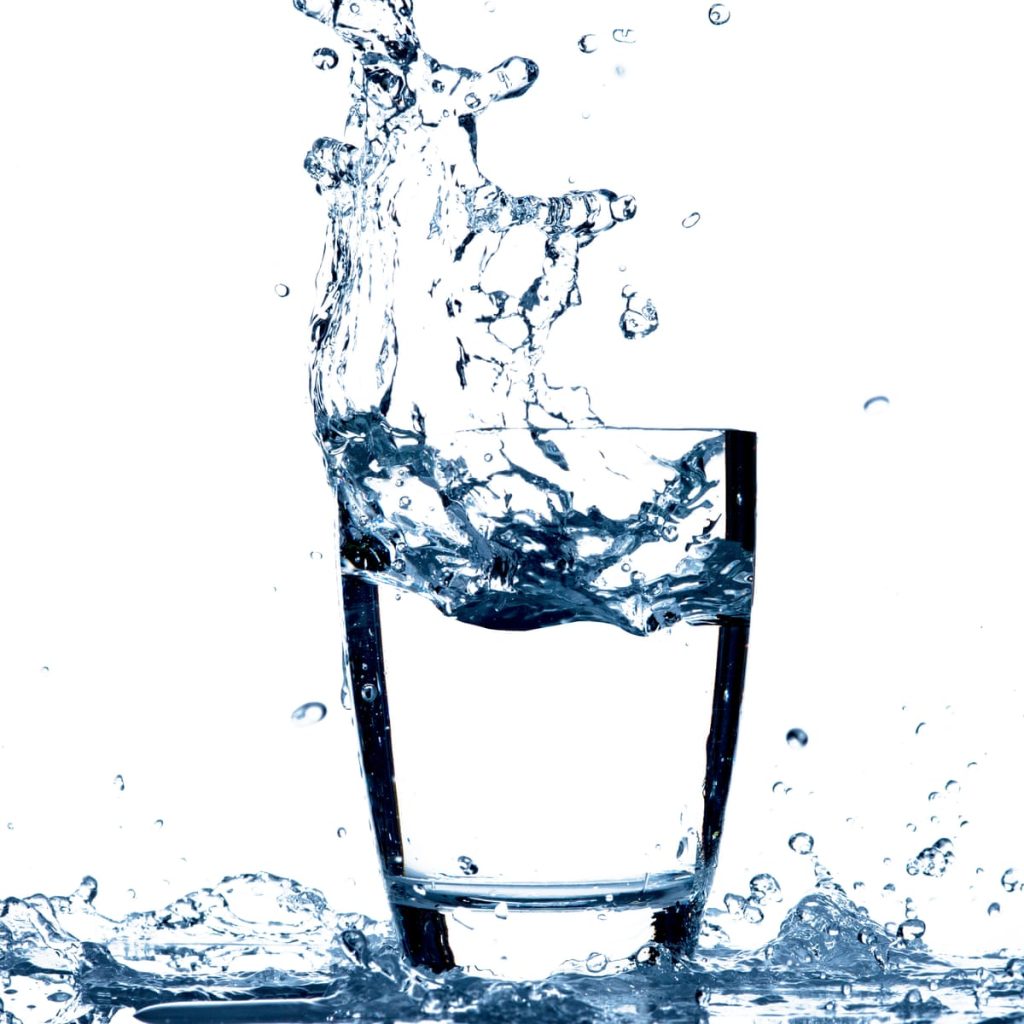This is part 7 in a seven-part series about the nutrients that our body needs to function optimally. Today’s post is covering the last essential nutrient: water. Most people don’t remember to list water as an essential nutrient. Most people know they need it, but they don’t think of it as a nutrient. Water is very important for many of the systems in our body.
Drinking water can prevent dehydration, which can cause unclear thinking, result in mood change, cause your body to overheat, and lead to constipation and kidney stones. Water makes up 60-70% of your total body weight, and around 90% of your brain weight. Here are some things water can do for you:

- Water boots energy. Water delivers important nutrients to all of our cells, including muscle cells which can help postpone muscle fatigue. Water also delivers nutrient to your brain, which is why dehydration can cause unclear thinking.
- Water helps you maintain, or achieve, a healthy weight. Sometimes when we feel thirsty or dehydrated, it can be mistaken for hunger, which often leads to unhealthy snacking. Adequate water intake helps your metabolism processes run efficiently, which can help you maintain your weight. Additionally, eating foods with higher water content means less calories.
- Water aids in digestion. Water aids in preventing constipation and other abdominal issues, especially those suffering from IBS. Water helps to move the digestive process along and helps your body absorb nutrients.
- Water detoxifies. Water moves toxins through your system and optimizes kidney function. Inadequate hydration means inadequate kidney function.
- Water hydrates skin. Forget expensive creams and cure-alls, water is the best defense against aging and wrinkles in the skin.
- Water lubricates and cushions joints. The fluid in our joints help to keep them lubricated and provide adequate cushioning. This can help prevent pain and injury.
- Water helps your body keep a normal temperature. Maintaining your body temperature in a normal range is important for all the systems in your body to run correctly. Sweating is how our body cools down, if you don’t have the water to sweat, you can’t cool down.
How much water do you need?
Every day you lose water through your breath, perspiration, urine and bowel movements. For your body to function properly, you must replenish its water supply by consuming beverages and foods that contain water.
So how much fluid does the average, healthy adult living in a temperate climate need? The U.S. National Academies of Sciences, Engineering, and Medicine determined that an adequate daily fluid intake is:
- About 15.5 cups (3.7 liters) of fluids a day for men
- About 11.5 cups (2.7 liters) of fluids a day for women
These recommendations cover fluids from water, other beverages and food. About 20% of daily fluid intake usually comes from food and the rest from drinks.
What about the advice to drink 8 glasses a day?
You’ve probably heard the advice to drink eight glasses of water a day. That’s easy to remember, and it’s a reasonable goal.
Most healthy people can stay hydrated by drinking water and other fluids whenever they feel thirsty. For some people, fewer than eight glasses a day might be enough. But other people might need more.
You might need to modify your total fluid intake based on several factors:
- Exercise. If you do any activity that makes you sweat, you need to drink extra water to cover the fluid loss. It’s important to drink water before, during and after a workout.
- Environment. Hot or humid weather can make you sweat and requires additional fluid. Dehydration also can occur at high altitudes.
- Overall health. Your body loses fluids when you have a fever, vomiting or diarrhea. Drink more water or follow a doctor’s recommendation to drink oral rehydration solutions. Other conditions that might require increased fluid intake include bladder infections and urinary tract stones.
- Pregnancy and breast-feeding. If you are pregnant or breast-feeding, you may need additional fluids to stay hydrated.
Is water the only option for staying hydrated?
No. You don’t need to rely only on water to meet your fluid needs. What you eat also provides a significant portion. For example, many fruits and vegetables, such as watermelon and spinach, are almost 100% water by weight.
In addition, beverages such as milk, juice and herbal teas are composed mostly of water. Even caffeinated drinks — such as coffee and soda — can contribute to your daily water intake. But go easy on sugar-sweetened drinks. Regular soda, energy or sports drinks, and other sweet drinks usually contain a lot of added sugar, which may provide more calories than needed.
Healthier Drink Options
Low or no calorie beverages
Plain coffee or teas, sparkling water, seltzers, and flavored waters, are low calorie choices that can be part of a healthy diet.
Drinks with calories and important nutrients
Low fat or fat-free milk, fortified milk alternatives such as unflavored soy or almond milks, or 100% fruit or vegetable juice contain important nutrients such as calcium, potassium, or vitamin D. These drinks should be enjoyed within recommended calorie limits.
Unsweetened, caffeinated drinks: moderate caffeine consumption (up to 400mg per day) is okay to include as part of a healthy diet. That’s about 3-5 cups of plain coffee.
Less healthy drink options
Sugary drinks
Regular sodas, fruit drinks, sports drinks, energy drinks, sweetened waters, and sweetened coffee and tea beverages, contain calories but have no nutritional value.
Alcoholic drinks
If you choose to drink, do so in moderation.
Drinks with sugar alternatives
Drinks that are labeled “sugar-free” or “diet” likely contain high-intensity sweeteners, such as sucralose, aspartame, or saccharine. There is some research that indicates that the intensity of the sweetness in the drinks make people crave and eat more sugar in other parts of their day. Use sugar alternatives sparingly.
Sports drinks
The average person should drink water, not sports drinks, to rehydrate. Sports drinks were intended to help replace carbohydrates and electrolytes in moderate to intense exercise lasting 60 minutes or more.
If you have questions about how much water and/or fluid you need in a day, or have more questions about ways to add healthy hydration into your day, make an appointment with your local dietitian.
Stay healthy!
Lisa Robinson-Mihiar, RDN, LD
ClubWorx Dietitian
Have a question you want Lisa to answer on the blog? Send your questions and ideas to Lisa at lrobinson (at) clubworx.net


